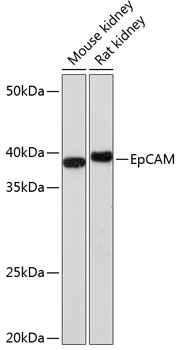Anti-EpCAM Antibody (CAB1107)
- SKU:
- CAB1107
- Product type:
- Antibody
- Reactivity:
- Human
- Mouse
- Rat
- Host Species:
- Rabbit
- Isotype:
- IgG
- Antibody Type:
- Monoclonal Antibody
- Research Area:
- Cell Biology
Frequently bought together:
Description
| Antibody Name: | Anti-EpCAM Antibody |
| Antibody SKU: | CAB1107 |
| Antibody Size: | 20uL, 50uL, 100uL |
| Application: | WB IHC |
| Reactivity: | Human, Mouse, Rat |
| Host Species: | Rabbit |
| Immunogen: | A synthesized peptide derived from human EpCAM |
| Application: | WB IHC |
| Recommended Dilution: | WB 1:500 - 1:2000 IHC 1:50 - 1:200 |
| Reactivity: | Human, Mouse, Rat |
| Positive Samples: | Mouse kidney, Rat kidney |
| Immunogen: | A synthesized peptide derived from human EpCAM |
| Purification Method: | Affinity purification |
| Storage Buffer: | Store at -20°C. Avoid freeze / thaw cycles. Buffer: PBS with 0.02% sodium azide, 0.05% BSA, 50% glycerol, pH7.3. |
| Isotype: | IgG |
| Sequence: | Email for sequence |
| Gene ID: | 4072 |
| Uniprot: | P16422 |
| Cellular Location: | |
| Calculated MW: | 35kDa |
| Observed MW: | 40KDa |
| Synonyms: | DIAR5, EGP-2, EGP314, EGP40, ESA, HNPCC8, KS1/4, KSA, M4S1, MIC18, MK-1, TACSTD1, TROP1 |
| Background: | This gene encodes a carcinoma-associated antigen and is a member of a family that includes at least two type I membrane proteins. This antigen is expressed on most normal epithelial cells and gastrointestinal carcinomas and functions as a homotypic calcium-independent cell adhesion molecule. The antigen is being used as a target for immunotherapy treatment of human carcinomas. Mutations in this gene result in congenital tufting enteropathy. [provided by RefSeq, Dec 2008] |
| UniProt Protein Function: | EPCAM: a single-pass type I membrane protein of the EPCAM family. May act as a physical homophilic interaction molecule between intestinal epithelial cells (IECs) and intraepithelial lymphocytes (IELs) at the mucosal epithelium for providing immunological barrier as a first line of defense against mucosal infection. Expressed in almost all epithelial cell membranes but not on mesodermal or neural cell membranes. Found on the surface of adenocarcinomas including pancreatic carcinoma. May be a marker of cancer stem cells. |
| UniProt Protein Details: | Protein type:Membrane protein, integral; Motility/polarity/chemotaxis Cellular Component: tight junction; cell surface; membrane; basolateral plasma membrane; apical plasma membrane; plasma membrane; integral to membrane; cell junction; lateral plasma membrane Molecular Function:protein complex binding Biological Process: positive regulation of cell proliferation; positive regulation of transcription from RNA polymerase II promoter; stem cell differentiation; negative regulation of apoptosis |
| UniProt Code: | P16422 |
| NCBI GenInfo Identifier: | 112293275 |
| NCBI Gene ID: | 17075 |
| NCBI Accession: | NP_032558.2 |
| UniProt Secondary Accession: | P16422,Q61512, |
| UniProt Related Accession: | Q99JW5 |
| Molecular Weight: | |
| NCBI Full Name: | epithelial cell adhesion molecule |
| NCBI Synonym Full Names: | epithelial cell adhesion molecule |
| NCBI Official Symbol: | Epcam |
| NCBI Official Synonym Symbols: | EGP; Ly74; gp40; CD326; EGP-2; TROP1; Egp314; Ep-CAM; EpCAM1; Tacsd1; GA733-2; Tacstd1 |
| NCBI Protein Information: | epithelial cell adhesion molecule |
| UniProt Protein Name: | Epithelial cell adhesion molecule |
| UniProt Synonym Protein Names: | Epithelial glycoprotein 314; EGP314; mEGP314; Protein 289A; Tumor-associated calcium signal transducer 1; CD_antigen: CD326 |
| Protein Family: | Epithelial cell adhesion molecule |
| UniProt Gene Name: | Epcam |
| UniProt Entry Name: | EPCAM_MOUSE |




